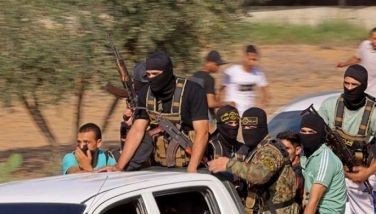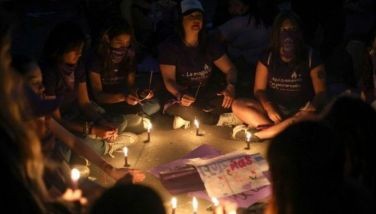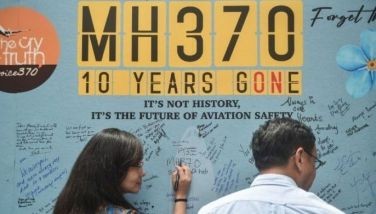US-Russian deal infuriates Syria's opposition, gives hope to political solution
DAMASCUS (Xinhua) - The United States and Russia struck a deal Saturday designed to strip Syria of its chemical weapons under international control, a move proposed by Moscow to spare Damascus a possible US strike.
Yet, the deal, which marks a new understanding between Moscow and Washington regarding the prospect of the Syrian conflict, apparently infuriates the exiled opposition and its armed wing inside Syria, as it pushed away the US military intervention in Syria, a war that was long-awaited by the opposition that hoped the strike could dethrone President Bashar al-Assad.
AMBITIOUS PLAN
After a three-day meeting in Geneva, US Secretary of State John Kerry and Russian Foreign Minister Sergey Lavrov agreed on a plan to eliminate Syria's chemical weapons under international control by mid 2014, a move seen as would open the door for a political solution to Syria's 30-month-old crisis and slam it in the face of possible foreign military intervention.
The Barack Obama administration sought to resort to a military action against Syria, following allegations by the Syrian rebels that troops of the Damascus government gassed civilians in a countryside of the capital on Aug. 21, reportedly killing hundreds.
Washington said it had evidence that the Syrian government was behind the incident, a claim the latter strongly denied and said the accusation logically played in the hands of the rebels who had been craving for a foreign military intervention.
For its part, Moscow said it believed the rebels staged a false flag attack to frame the Assad government and push the international community to militarily intervene in Syria.
After long wrangling and tit-for-tat media statements, Russia proposed an initiative to strip Syria of its chemical weapons. The last-minute proposition was hailed by Damascus, which said it would surrender its chemical stokes not because of fears of a possible US strike, but of its confidence in "Russia's wisdom."
Moreover, Syria applied for joining the Chemical Weapons Convention, which outlaws the production, possession and use of chemical weapons, and the UN confirmed receiving the treaty papers from Syria.
In Geneva, Kerry outlined a framework document under which Syria must submit a "comprehensive listing" of its chemical weapons stockpiles within one week. While warning that if Syria fails to comply, the deal could be enforced by a UN resolution backed by the threat of sanctions or military force, Kerry stressed that Damascus must give inspectors "an immediate and unfettered right to inspect any and all sites in Syria."
Kerry said the inspectors must be on the ground by November and destruction or removal of the chemical weapons must be completed by mid-2014. The agreement has been hailed by France, Britain and the UN.
EXILED OPPOSITION INFURIATED
After pinning huge hopes on the planned US intervention, the exiled opposition and its armed wing in Syria seem to have found themselves alienated after the new deal that deflated their long- awaited dream of watching the US Tomahawk raining down Damascus.
During a press conference of the Western-backed Syria's National Coalition (SNC), the main opposition umbrella in exile, Salim Idris, general of the rebel Free Syrian Army, rejected the American-Russian agreement and refused to declare a ceasefire with the government troops.
Striking a muscular tone, Idris said the deal was only between the United States and Russia, and that the Syrian opposition does not accept it. On the contrary, he said they would continue fighting on the ground against the government forces.
He further tried to stir up new baseless accusations that the Syrian government had started to get rid of its chemical stockpiles by giving it to his allies in Lebanon and Iraq.
Moreover, and in an apparent move to show consistency after numerous faltering attempts, the SNC named Ahmad Tumeh al-Khader, a veteran opposition figure, as the interim "prime minister."
The SNC has previously elected Ghassan Hitto as an interim leader, but the attempt was themed with abject failure as Hitto resigned recently after failing to form a government.
Sami Klaib, a Lebanese journalist and political expert, said the most important result of the Russian-American deal is: " Washington has restarted recognizing the Syrian administration, otherwise, why would it ask it to join the chemical weapons treaty. "
TURNING POINT?
While Damascus received the deal with a tight lip, Ali al-Qasem, editor-in-cheif of the state-run al-Thawra newspaper, told Xinhua that the fresh deal by Washington and Moscow could open a new gate for diplomacy to resolve the long-standing conflict in Syria, saying that the deal "constitutes an important turning point in the political landscape."
Qasem noted that the new deal would avert the region and the world a dangerous "military adventure" that could have grave regional repercussions.
"What happened today was important, if the US intentions were truthful ..." he said.
- Latest
- Trending





























